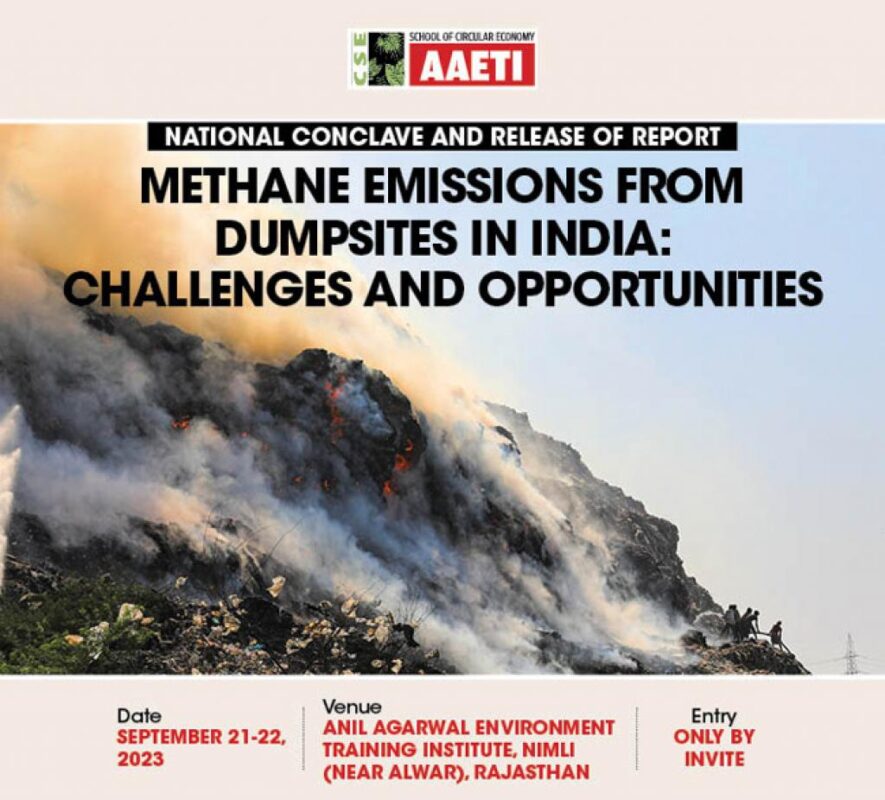National Conclave and Release of Report Methane Emissions from Dumpsites in India: Challenges and Opportunities: CSE

![]()
Date: 21st Sep – 22nd Sep / Venue: Rajasthan / Virtual
The Centre for Science and Environment (CSE) is a public interest research and advocacy organisation based in New Delhi. CSE researches into, lobbies for and communicates the urgency of development that is both sustainable and equitable. The scenario today demands using knowledge to bring about change. In other words, working India’s democracy. This is what we aim to do.The challenge, we see, is two-pronged. On the one hand, millions live within a biomass based subsistence economy, at the margins of survival. The environment is their only natural asset. But a degraded environment means stress on land, water and forest resources for survival. It means increasing destitution and poverty. Here, opportunity to bring about change is enormous.But it will need a commitment to reform – structural reform- in the way we do business with local communities. On the other hand, rapid industrialization is throwing up new problems: growing toxification and a costly disease burden. The answers will be in reinventing the growth model of the Western world for ourselves, so that we can leapfrog technology choices and find new ways of building wealth that will not cost us the earth.
Physical Participation: Only by invite
Methane is a short-lived climate pollutant. But its atmospheric concentration has more than doubled over the years, primarily due to anthropogenic activities. With a global warming potential that is 25 times more than carbon dioxide, methane is also considered to be a contributor to formation of ground-level ozone or tropospheric ozone, a hazardous air pollutant and greenhouse gas, exposure to which causes one million premature deaths every year globally.
Methane is produced during the decomposition of organic matter in solid waste. This can occur in landfills, open dumps and other waste disposal sites. Urban India generates nearly 1.6 lakh tonne of municipal solid waste every day, 50 to 60 per cent of which is biodegradable in nature. A significant portion of mixed MSW is disposed of in dumpsites and landfills.
Landfills, in fact, are the third-largest source of methane emissions globally, after oil and gas systems and agriculture. In 2016, an estimated 1.6 billion tonne of CO2e (of methane) was emitted during landfill waste management worldwide. According to the World Bank, this number is expected to reach 2.6 billion tonne of CO2e by 2050.
Centre for Science and Environment (CSE) is organising a two-day conclave to release its report titled Methane emissions from dumpsites in India. A pool of domain experts from the government, Industry, research institutes and local administrations will talk about the mitigation strategies of methane in the waste sector.
HIGHLIGHT
This Conclave is open for waste management practitioners, officials from Central and state urban departments and municipalities, civil society organisations, academia, research institutes, waste management industry representatives, journalists and others. Please write to us for participating in the event. Limited seats available.
NOTE: The symposium is a physical event where participation is only by invitation. The event will also be streamed live on zoom and other social media platforms and can be attended virtually. Officials from ministry and state urban departments and municipalities, urban and town planners, civil society organizations, academia, research institutes, waste management industry representatives, students, journalists and others may register using the link given below. All those who register will receive an automatic confirmation. However, we request you to register yourself at the earliest and reach out to us in case of any queries.
For more details, please contact:
Minakshi Solanki
Research Associate
minakshi.solanki@cseindia.org
7827392845
Dr. Richa Singh
Programme Manager
richa.singh@cseindia.org

